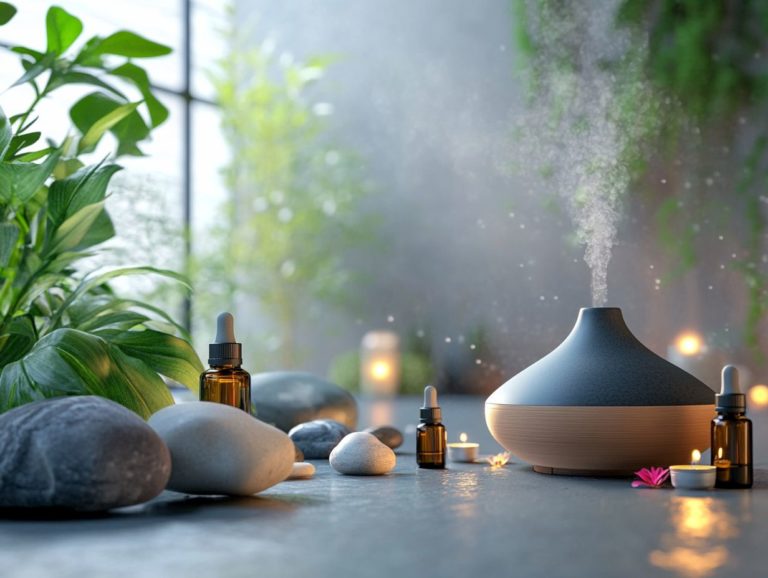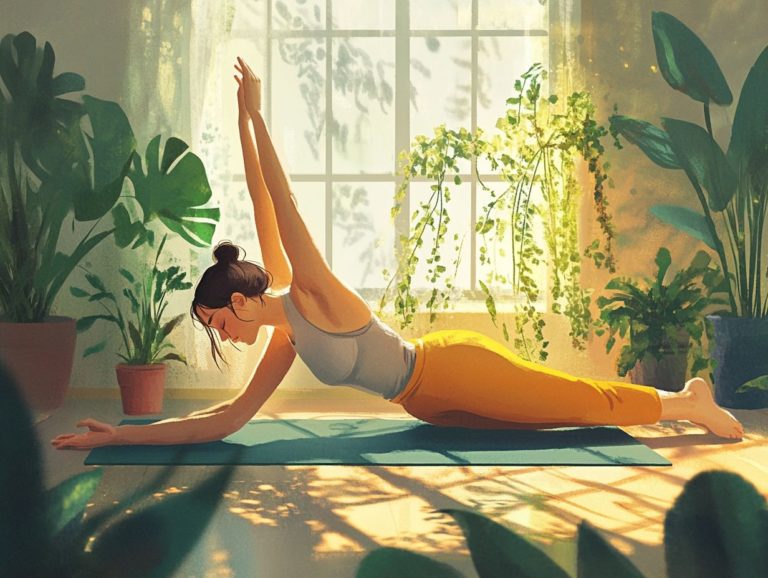5 Relaxation Techniques for Seniors
As you age, discovering moments of peace and tranquility becomes essential for your overall well-being. Imagine feeling a wave of calm wash over you this is possible with simple relaxation techniques!
This article delves into five effective relaxation techniques designed specifically for seniors, such as deep breathing exercises, gentle stretching, and the soothing power of music. You ll learn how these practices can enhance both your mental and physical health and the vital role caregivers play in facilitating relaxation. We will also address important precautions to consider.
Embark on this journey with us to uncover simple yet impactful ways to cultivate calm and joy in your everyday life.
Contents
- Key Takeaways:
- 1. Deep Breathing Exercises
- 2. Gentle Stretching
- 3. Meditation and Mindfulness
- 4. Listening to Soothing Music
- 5. Engaging in a Hobby or Creative Activity
- How Can Relaxation Techniques Benefit Seniors?
- What Are Some Other Relaxation Techniques for Seniors?
- How Can Caregivers Help Seniors with Relaxation Techniques?
- Are There Any Precautions Seniors Should Take When Practicing Relaxation Techniques?
- How Often Should Seniors Practice Relaxation Techniques?
- What Are the Long-Term Effects of Regularly Practicing Relaxation Techniques?
- Frequently Asked Questions
- What are the benefits of practicing relaxation techniques for seniors?
- What are the 5 relaxation techniques recommended for seniors?
- How can deep breathing help seniors relax?
- Is it necessary to have prior experience to practice relaxation techniques?
- How often should seniors practice relaxation techniques?
- Are there any precautions seniors should take before practicing relaxation techniques?
Key Takeaways:
- Deep breathing can help seniors relax and reduce stress in their daily lives.
- Gentle stretching can improve flexibility and mobility, promoting relaxation and overall well-being.
- Meditation and mindfulness can provide seniors with a sense of calm and help them stay present in the moment.
1. Deep Breathing Exercises
Deep breathing exercises are a cornerstone of relaxation techniques. They significantly elevate your mental well-being and stress management while supporting heart health. This is especially beneficial for seniors, who often face increased stress from chronic issues.
These exercises come in various forms, such as diaphragmatic breathing, which focuses on fully engaging the diaphragm, box breathing, and the 4-7-8 technique. Each is designed to cultivate a sense of calm. For parents seeking effective ways to unwind, exploring 5 relaxation techniques for parents can be particularly beneficial. The advantages of these practices extend beyond simple relaxation; they reduce muscle tension, enhance cardiovascular health by lowering blood pressure, and sharpen mental clarity.
Health professionals, including those from the Mayo Clinic, recommend incorporating these techniques into your daily routine. They are important for promoting overall wellness and resilience in the face of life s challenges.
2. Gentle Stretching
Gentle stretching is a vital relaxation technique. It alleviates muscle tension, enhances physical health, and supports overall well-being, especially for seniors who may be dealing with chronic pain from conditions like heart disease or stiffness.
Incorporating a variety of gentle stretching routines into your daily life can lead to significant improvements in flexibility and mobility. Techniques such as seated forward bends, shoulder rolls, and ankle circles not only promote better posture but also boost blood circulation, aiding in the recovery of stiff muscles.
These simple stretches can be easily integrated into your morning routine or practiced during breaks, encouraging a proactive approach to wellness. When you combine these stretching exercises with deep-breathing techniques, like diaphragmatic breathing, you enhance relaxation and achieve a more tranquil state of mind for an improved quality of life.
3. Meditation and Mindfulness
Meditation and mindfulness practices are powerful relaxation techniques. They can significantly enhance your mental well-being, boost thinking skills, and provide effective tools to manage stress and emotional discomfort.
These practices include mindfulness meditation, where you focus your attention on the present moment, and guided imagery, which invites you to visualize calming mental landscapes. By engaging in these forms of meditation, you can notably reduce stress hormone levels in your body, paving the way for tranquility and balance.
As a result, you may enjoy improvements in sleep quality, allowing for deeper and more restorative rest. These techniques also help build emotional resilience, equipping you to navigate life’s challenges more effectively while fostering a profound sense of inner peace and stability.
Start today take a moment to breathe deeply and feel the difference it makes!
4. Listening to Soothing Music
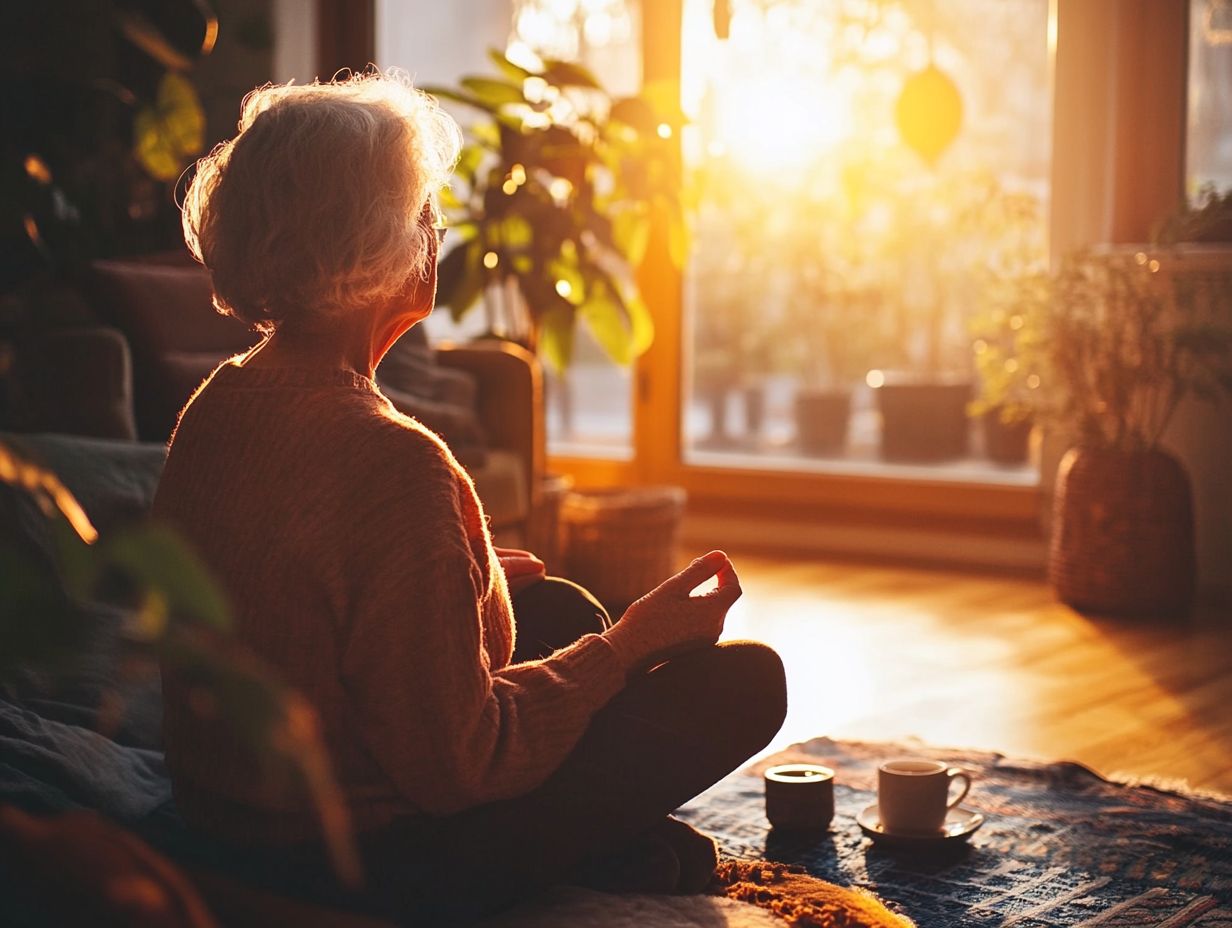
Listening to soothing music therapy is an enriching relaxation technique that can significantly enhance your mental well-being. It serves as an effective method for managing stress, especially if you’re a senior dealing with chronic stress.
Different music genres elicit unique emotional responses. For example, classical music often ushers in a sense of tranquility, while soft instrumental or ambient tracks can help craft a serene environment.
Engaging in music therapy can lead to an improved mood, reduced anxiety, and a heightened sense of connection with others. To maximize these benefits, you can curate personalized playlists that resonate with your tastes and the mood you wish to foster. Try creating a soothing playlist today!
This tailored approach allows for a more profound relaxation experience, making it easier for you to unwind and rejuvenate mentally.
5. Engaging in a Hobby or Creative Activity
Engaging in a hobby is a fantastic way to relax and boost your mood! It not only fosters mental well-being but also stimulates thinking skills and encourages social connections elements essential for enhancing your quality of life as a senior.
Activities like painting, gardening, and crafting offer you an outlet for self-expression. They invite you to explore your surroundings and unleash your creativity. Pursuing these interests provides a sense of accomplishment while promoting mindfulness, allowing you to focus on the present moment.
These hobbies can also lead to community engagement. Many seniors find joy in participating in classes or clubs, cultivating friendships, and reducing feelings of isolation. As you master new skills or nurture plants, you may experience a noticeable uplift in your mood, enhancing your overall emotional health and contributing to a more fulfilling life.
How Can Relaxation Techniques Benefit Seniors?
Relaxation techniques are essential for enhancing your mental well-being, managing chronic stress, and promoting heart health. By incorporating these practices into your routine, you can dramatically improve your quality of life don’t wait to start!
Methods such as deep breathing exercises, meditation, and progressive muscle relaxation have been shown to lower cortisol levels, the body s primary stress hormone. A study by the American Psychological Association reveals that individuals who engage in relaxation techniques regularly experience a remarkable 30% reduction in stress and anxiety symptoms.
Health professionals frequently recommend these approaches, often sharing testimonials from seniors who have noticed an improvement in mood and cognitive function after making them part of their daily lives. Embracing effective relaxation practices is essential for promoting overall health as you age.
What Are Some Other Relaxation Techniques for Seniors?
In addition to popular techniques like deep breathing and meditation, you can explore a variety of relaxation methods designed specifically for seniors. These include tai chi, aromatherapy, visualization, and progressive muscle relaxation. These practices can significantly enhance your overall mental and physical health.
Incorporating these techniques into your daily routine can lead to remarkable improvements in your well-being. Take tai chi, for instance; it gracefully combines gentle movements with mindfulness to promote balance and reduce stress. Aromatherapy, on the other hand, utilizes essential oils to uplift your mood and create a soothing atmosphere.
Visualization techniques allow you to mentally escape to serene locations, fostering a deep sense of peace, while progressive muscle relaxation helps you alleviate tension by guiding you through the systematic relaxation of various muscle groups. To enhance your practice, consider exploring 5 relaxation techniques to alleviate anxiety. Take control of your well-being today by customizing these techniques to fit your needs!
How Can Caregivers Help Seniors with Relaxation Techniques?
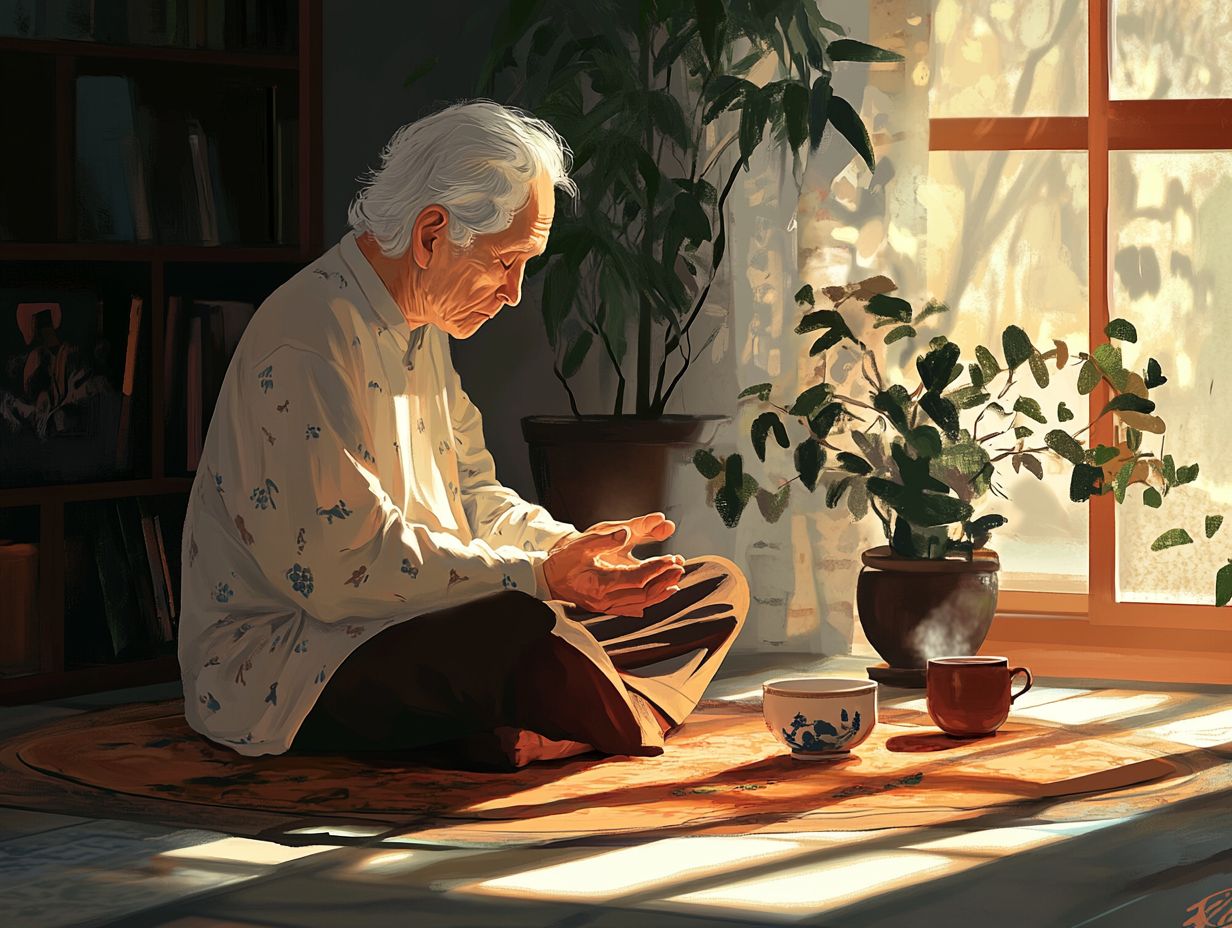
Caregivers play a crucial role in supporting seniors by introducing them to relaxation techniques. They nurture healthy ways to cope and enhance social connections elements essential for emotional and mental well-being.
To effectively encourage seniors to embrace these practices, consider implementing specific strategies. Create a calming space adorned with soothing scents and gentle music. This will make the experience more enjoyable for them.
Establishing a routine provides seniors with a sense of security as they adopt these techniques. Exercise patience, recognizing that adaptation may take time.
A supportive environment empowers seniors to comfortably explore various relaxation methods whether it’s guided meditation (a practice where you follow spoken instructions to reach a calm state), deep-breathing exercises, or gentle yoga, like tai chi. Incorporating 5 relaxation techniques for children can also be beneficial. This ultimately fosters a profound sense of peace and well-being.
Are There Any Precautions Seniors Should Take When Practicing Relaxation Techniques?
Relaxation techniques can transform your life. They bring a wealth of benefits, but it s essential to take specific precautions to ensure your safety, especially if you have chronic pain or other health concerns. Consulting with health professionals when needed is a wise step.
Consider your physical limitations, as they vary from person to person and may require you to modify certain practices. If you have limited mobility, focusing on seated or gentle movements can help you avoid strain. Be mindful of your existing medical conditions; what works wonders for one individual might not suit another.
A tailored approach, ideally developed in discussion with your healthcare provider, can assist you in selecting the most appropriate techniques. Remember, gradual progression is vital. This allows your body to adapt and respond positively over time, ensuring you don t overwhelm yourself in the process.
How Often Should Seniors Practice Relaxation Techniques?
Establishing a consistent practice of relaxation techniques is essential for you, especially as you navigate your golden years. Engaging in these practices several times a week can significantly enhance your mental well-being and overall quality of life.
To create a routine that feels seamless, consider setting aside specific times each day for activities like deep breathing exercises, gentle stretching, or mindfulness meditation. Morning sessions can set a positive tone for the day, while evening practices help you unwind before bedtime. Incorporating some of the top relaxation techniques for busy professionals can further enhance your routine.
Incorporating these techniques into your existing routines such as practicing deep breathing during coffee breaks or meditating after meals can make them feel more manageable and integrated into your life. Joining a class or group can provide that extra bit of motivation and social interaction, enriching your experience and fostering a sense of community.
What Are the Long-Term Effects of Regularly Practicing Relaxation Techniques?
Regularly practicing relaxation techniques can yield profound long-term benefits for you, including enhanced mental well-being, improved heart health, and sharper cognitive function. This is particularly valuable for seniors who wish to preserve their independence and quality of life.
Research shows that these techniques can effectively lower stress hormones, helping you achieve a calmer state of mind and fostering emotional resilience. Over time, you may notice improvements in your emotional health, leading to reduced anxiety and fewer depressive symptoms.
On a physiological level, benefits include lower blood pressure essential for cardiovascular health and improved sleep quality that promotes restorative rest.
These combined effects enhance your daily functioning and create a positive feedback loop, encouraging a proactive approach to your overall wellness and longevity.
Frequently Asked Questions
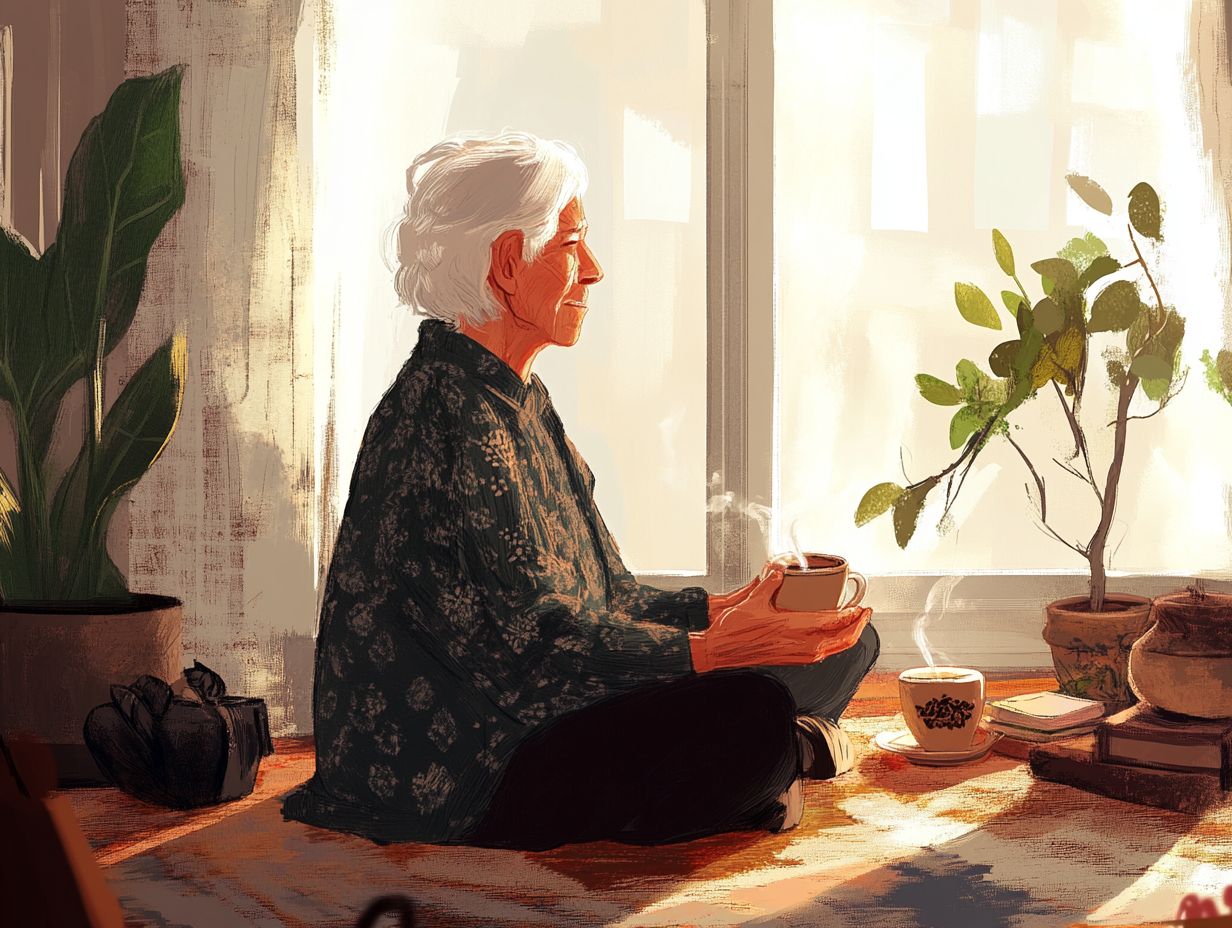
Start your relaxation journey today! Incorporate these techniques into your life for lasting benefits!
What are the benefits of practicing relaxation techniques for seniors?
Relaxation techniques offer many benefits for seniors. They can reduce stress and anxiety, improve sleep quality, lower blood pressure, and boost overall well-being.
What are the 5 relaxation techniques recommended for seniors?
The five relaxation techniques for seniors include deep breathing, progressive muscle relaxation, guided imagery, mindfulness meditation, and gentle yoga. Each technique is easy to learn and practice.
How can deep breathing help seniors relax?
Deep breathing can lower heart rate and blood pressure. It also eases muscle tension and increases oxygen flow to the brain, promoting calmness.
Is it necessary to have prior experience to practice relaxation techniques?
No prior experience is needed. Anyone, regardless of age or physical ability, can learn and practice these techniques.
How often should seniors practice relaxation techniques?
Seniors should practice these techniques at least two to three times a week. Regular practice helps maximize the benefits!
Are there any precautions seniors should take before practicing relaxation techniques?
Consult your doctor if you have health conditions or concerns before starting any new relaxation techniques. Always listen to your body and practice in a safe, comfortable environment.





